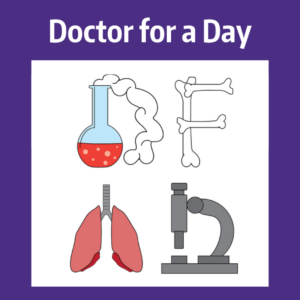 Authors:
Authors:
- Kareena Patel, she/her, Graduate Student, School of Medicine, University of Washington, Seattle campus
- Celeste Coler, she/her, Medical Student, School of Medicine, University of Washington, Seattle campus
- Nora Coronado, she/her, Director of Community Engagement, Office of Healthcare Equity, School of Medicine, University of Washington, Seattle campus
- Estell Williams, she/her, Assistant Professor of Surgery and Executive Director of Doctor For A Day, School of Medicine, University of Washington, Seattle campus
Project Description
Doctor For A Day (DFAD) is a youth outreach program that empowers K-12 youth from disadvantaged backgrounds to pursue a career in healthcare. DFAD hosts monthly interactive workshops where students can engage in hands-on activities and connect with healthcare professionals who share similar backgrounds and serve as mentors. In this study, we assess how students who attend DFAD events perceive their self-efficacy and sense of belonging in healthcare professions.
Project Question
African American/Black, Indigenous, and Hispanic/Latino people are underrepresented in the health professions. Many barriers that underrepresented minority (URM) youth face when pursuing healthcare careers contribute to this disparity, including limited exposure to health careers, lack of concordant mentors, and lack of academic preparation. DFAD aims to address these barriers through its unique multi-level mentoring and programming. This study’s objective was to assess the impact of DFAD participation on URM students’ perceptions of self-efficacy and interest in healthcare careers.
Context
DFAD partners with community organizations across the Greater Seattle area to host monthly workshops in community centers and on UW campus. K-12 URM students engage in activities such as suturing and ultrasound through workshops led by medical students, residents, and faculty from various specialties. In addition to facilitating technical skill development, volunteers serve as mentors and role models who come from similar backgrounds and have successfully navigated the path to health careers.
Methods
We conducted a retrospective analysis of 1239 K-12 students who attended at least one of 21 in-person DFAD events between 2017-2023. An anonymous post-participation survey was distributed following each DFAD event. In addition to assessing demographics, the survey included questions on students’ career goals, self-efficacy, and feedback for the event. Self-efficacy was defined as one’s belief in their ability to achieve a goal and was measured on a 5-point Likert scale.
Impact/Assessment
Among those who attended an in-person DFAD event from 2017-2023 and completed participation surveys, 30% identified as African American/Black, 30% identified as Asian, 18% identified as Latinx/Hispanic, 7% identified as White, 3% identified as Middle Eastern, 2% identified as American Indian/Native American/Alaska Native, and 10% identified as multiracial or other. 76% of students identified as female, and 24% identified as male. 60% of participating students reported that they receive free or reduced-price lunch, and 31% reported that their parent’s highest educational attainment was a high school diploma. After attending a DFAD event, 84% of participants reported that they were more likely to attend college, 73% reported that they were more likely to pursue a career in a healthcare profession, 84% reported that they better understood what is required to go to a healthcare professional school, and 70% said they better understood what a doctor does. Importantly, 78% reported that after attending an event, they felt that becoming a healthcare professional was an achievable goal. In an updated survey distributed to participants who attended DFAD events in 2023, 61% of students responded “yes” and 34% of students responded “maybe” when asked if they intended to spend their career in a healthcare related field.
Application
This study demonstrated that DFAD programming is utilized by URM students with multiple social and economic barriers to healthcare careers. Additionally, survey results indicate that participation in DFAD programming is associated with increased self-efficacy and interest in healthcare careers among URM youth.
Cultivating a strong sense of self-efficacy and belonging is crucial to URM students’ academic and professional success. Conversely, poor self-efficacy can amplify the perceived obstacles to entering healthcare careers and disempowers students from pursuing their goals. As a metric of emotional health and well-being, and a predictor of motivation and learning, self-efficacy is a key performance indicator.
The DFAD model is novel in its approach, in that it utilizes service learning to provide multi-level mentoring through its engagement of faculty, fellows, residents, and medical students. Learning is facilitated at all levels and inter-professionalism is encouraged and enhanced by giving both the medical student volunteers and K-12 participants exposure to different medical professions and specialties. DFAD’s model may serve as a template for other STEM departments at UW and other universities.